Related Research Articles
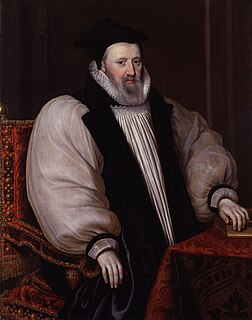
George Abbot was an English divine who was Archbishop of Canterbury from 1611 to 1633. He also served as the fourth Chancellor of Trinity College, Dublin, from 1612 to 1633.
Walter Map was a medieval writer. He wrote De nugis curialium, which takes the form of a series of anecdotes of people and places, offering insights on the history of his time.

Sir Robert Harley was an English statesman who served as Master of the Mint for Charles I and later supported the parliamentarians during the English Civil War.
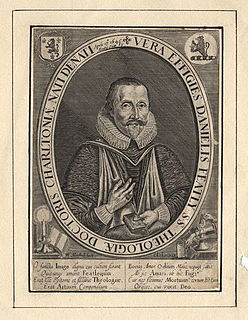
Daniel Featley, also called Fairclough and sometimes called Richard Fairclough/Featley, was an English theologian and controversialist. He fell into difficulties with Parliament due to his loyalty to Charles I of England in the 1640s, and he was harshly treated and imprisoned at the end of his life.
John Scory was an English Dominican friar who later became a bishop in the Church of England.

Peter of Aigueblanche was a medieval Bishop of Hereford. A nobleman from Savoy, he came to England as part of the party accompanying King Henry III's bride Eleanor of Provence. He entered the royal service, becoming bishop in 1241. He then served the king for a number of years as a diplomat, helping to arrange the marriage of Prince Edward. Peter became embroiled in King Henry's attempts to acquire the kingdom of Sicily, and Peter's efforts to raise money towards that goal brought condemnation from the clergy and barons of England. When the barons began to revolt against King Henry in the late 1250s and early 1260s, Peter was attacked and his lands and property pillaged. He was arrested briefly in 1263 by the barons, before being mostly restored to his lands after the Battle of Evesham.

Paul Foley, also known as Speaker Foley, was the second son of Thomas Foley of Witley Court, the prominent Midlands ironmaster.
Hugh Foliot was a medieval Bishop of Hereford. Related somehow to his predecessor at Hereford, he served as a priest and papal judge as well as being an unsuccessful candidate as Bishop of St David's in Wales. In 1219, he was appointed Bishop of Hereford. During his time in office, he mostly attended to ecclesiastical duties, but did occasionally serve as a royal administrator. He helped found a hospital and a priory, and died in 1234 after a months-long illness.
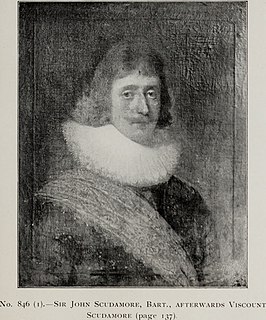
John Scudamore, 1st Viscount Scudamore was an English diplomat and politician who sat in the House of Commons at various times between 1621 and 1629. In 1628 he was created Viscount Scudamore in the Irish peerage.

George Coke or Cooke was successively the Bishop of Bristol and Hereford. After the battle of Naseby in 1645, Hereford was taken and Coke was arrested and taken to London. He avoided charges of High Treason in January 1646 and died in Gloucestershire that year.
Thomas Falkner was an English Jesuit missionary, explorer and physician, active in the Patagonia region for nearly forty years. His primary work, The Description of Patagonia, was written towards the idea of English colonization, but it remains valuable as a record of early life, flora and fauna of the region. He is credited with recording the first fossil in present-day Argentina.
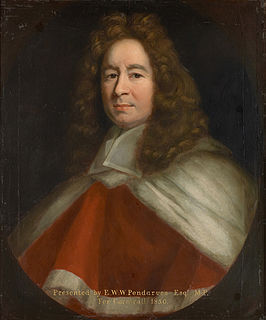
Sir William Gregory was a British judge and politician. Born the son of the vicar of Fownhope, he was educated at Hereford Cathedral School and All Souls College, Oxford and was then called to the Bar from Gray's Inn. In 1653 he married Katharine, only daughter and heiress of James Smith of Tillington, by whom he had an only son, James, who died in 1691 before his father. It was not until 1677 that William gained prominence, being elected a Serjeant-at-law. In March 1677 the election of Sir Thomas Williams as a Member of Parliament for Weobly was called into question and declared void, so William Gregory offered himself as a candidate and was elected without opposition on 9 March.
Robert Bennet (Bennett) was an English Anglican bishop and the Dean of Windsor.
Thomas Good was an English academic and clergyman, and Master of Balliol College, Oxford. He is known as a moderate in and orthodox apologist for the Church of England, engaging with Richard Baxter and urging him to clarify a 'middle way'.
Nicholas [of] Hereford was an English Bible translator, Lollard, reformer on the side of John Wycliffe, Fellow of The Queen's College, Oxford and Chancellor of the University of Oxford in 1382. He was a Doctor of Theology, which he achieved at Oxford University in 1382.
Thomas Pierce or Peirse (1622–1691) was an English churchman and controversialist, a high-handed President of Magdalen College, Oxford, and Dean of Salisbury.

Robert Morgan was a Welsh Bishop of Bangor.
John Bullingham was the Bishop of Gloucester in the Church of England from 1581.
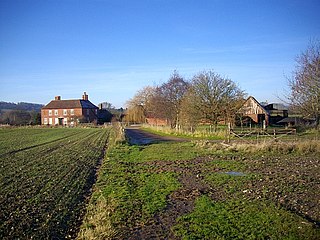
Henry Bright was a clergyman and schoolmaster in Worcester. He served for 38 years Headmaster at The King's School, Worcester, and is mentioned by Thomas Fuller and Anthony Wood as an exceptional teacher, particularly of Latin, Greek and Hebrew. Many of his pupils are notable for their faculty in Latin and Greek and their impact on theological matters.
John Duncumb was an English clergyman and antiquary. He is best known as the author of an unfinished county history of Herefordshire.
References
![]() This article incorporates text from a publication now in the public domain : "Ely, William". Dictionary of National Biography . London: Smith, Elder & Co. 1885–1900.
This article incorporates text from a publication now in the public domain : "Ely, William". Dictionary of National Biography . London: Smith, Elder & Co. 1885–1900.